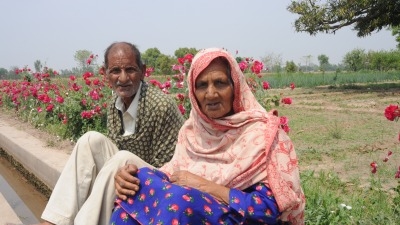THAUBAL, Sheikhupura District, Pakistan – Flowers bloom where poverty once flourished in fields tended by Ahmad Ali. It’s a transformation that still amazes the 60-year-old man, his wife, Meeran, and 31 other families in the tiny village of Thaubal in Pakistan’s Punjab province.
Not long ago, Ali was best known among friends as the man who could barely feed his family after he lost an arm in a fodder-cutting machine. He tried to grow wheat on his one acre of rented land, but “most days, it wasn’t enough,” recalls Ali, shaking his head. “We barely survived.”
But that was before his young friend and fellow villager, Mohammad Habib, 30, heard from other farmers in the district about the Pakistan Poverty Alleviation Fund (PPAF), supported by the World Bank.
The government of Pakistan created the PPAF to provide loans, grants, and technical assistance to the poorest individuals and communities in the country to help them earn better incomes and improve their lives.
Loans help turn crops to profit
College-educated but out of work, Habib approached officials at the Rural Community Development Society (RCDS), a PPAF partner organization in Sheikhupura District. He wanted a loan that might help convert unprofitable wheat and rice crops to a more lucrative vegetable and flower business.
Together, the farmers would plant tomatoes, chilies, bitter gourds, onions, garlic, cucumbers, and okras. Fields of roses, marigolds, sunflowers and other blooms were also planned. Plus, they wanted a bio-gas plant to replace costly diesel fuel needed to pump water from their tube well, and to power a cooling system for vegetable cold storage.
After a technical assessment, RCDS agreed to provide the villagers a bio-gas plant, watercourse lining and drip irrigation facilities at the cost of Rs 1.38 million (about $15,000), with a 30 percent contribution by the local farming communities.
As a result, 2,540 feet of watercourses were lined with brick, a bio-gas plant was installed and drip irrigation tubing for around three acres of land for horticulture were provided in the village. The group was expected to start repaying the loan with proceeds from their crop sales.
It was an ambitious idea with plenty of merit, says Qaisar Iqbal, manager of RCDS.
Ali is still clearly surprised by the result. When he grew wheat it was often a losing proposition, he says. Typically, once a wheat farmer pays for seed, fertilizer, and pesticides, he can still face a 30 to 50 percent loss on their harvest. This prompts a downward spiral into poverty, as loans with exorbitant interest rates are often taken from moneylenders, explains Iqbal.
But with flower and vegetable gardening, profits come easily, notes Iqbal. Each plant might cost Rs 3, but will create sales of Rs 13 and a clear profit of Rs 10 (about 10 cents). Better yet, flowers and vegetables are harvested every few months, not just twice annually like wheat or rice.
“Now in this village, about 80 percent of the fields have been converted to flowers and vegetables, with just 20 percent left to conventional crops. The crop patterns here have almost entirely shifted,” adds Iqbal.
Ali’s wife, Meeran, says their family always struggled in the past. “Now we are all working much better. We have enough to eat meat and drink Lassi (a local drink derived from yogurt). We can save money for the marriage of our son and daughter.”

